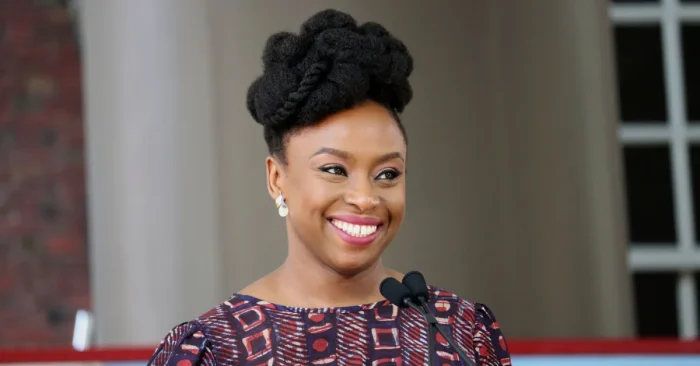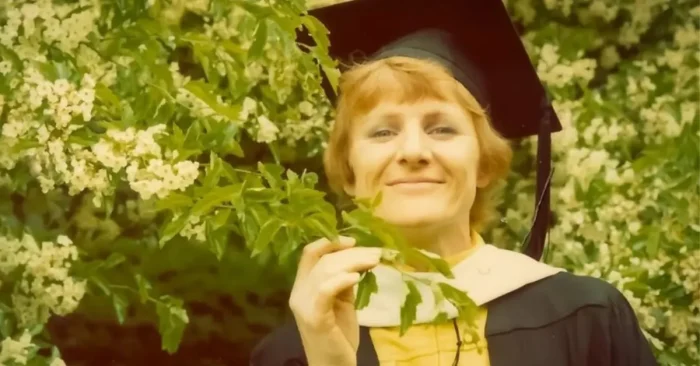Chimamanda Ngozi Adichie – Biography
Early Life and Education of Chimamanda Ngozi Adichie
Chimamanda Ngozi Adichie was born on September 15, 1977, in Enugu, Nigeria. She grew up in the university town of Nsukka, where her father worked as a professor and her mother was the first female registrar at the University of Nigeria. Raised in an academic and literary environment, Adichie was introduced to books and storytelling at an early age. She initially studied medicine at the University of Nigeria but left for the United States at 19 to pursue her passion for writing. In the U.S., she earned a bachelor’s degree in communication and political science from Eastern Connecticut State University, followed by a master’s in creative writing from Johns Hopkins University and a master’s in African Studies from Yale University.
Debut Novel and Early Success
In 2003, Adichie published her debut novel, “Purple Hibiscus.” The story, centered on a teenage girl in a strict religious household during Nigeria’s political unrest, was praised for its emotional depth and cultural insight. The novel won the Commonwealth Writers’ Prize for Best First Book and quickly established Adichie as an important new literary voice. “Purple Hibiscus” introduced her distinctive style—thoughtful prose, strong female characters, and layered storytelling rooted in Nigerian society and values. Her ability to merge intimate personal experiences with larger political and cultural themes became a hallmark of her work.
Half of a Yellow Sun and Global Acclaim
Adichie’s second novel, “Half of a Yellow Sun,” was published in 2006 and focused on the Nigerian-Biafran War. It explores the lives of ordinary people caught in the conflict, revealing the human cost of war and political instability. The novel received international praise and won the Orange Prize for Fiction. Its success brought her global attention and solidified her place in contemporary literature. The book was adapted into a film in 2013, expanding her reach to an even broader audience. Adichie’s portrayal of historical trauma through personal stories earned her comparisons to literary icons like Chinua Achebe.
Americanah and Race in the Diaspora
In 2013, Adichie released “Americanah,” which tells the story of a young Nigerian woman navigating race and identity in the United States and the United Kingdom. The novel addressed themes of immigration, belonging, and the nuances of being Black in America versus Africa. “Americanah” won the National Book Critics Circle Award and was listed among The New York Times’ top books of the year. The novel’s blend of humor, social critique, and personal reflection resonated with readers worldwide. It marked a shift toward more global, contemporary issues, reflecting Adichie’s cross-cultural experiences.
Feminism and Public Influence
Beyond fiction, Adichie gained global recognition through her TED Talks and essays. Her 2012 talk, “We Should All Be Feminists,” became a viral sensation and was later adapted into a widely circulated essay. The piece was sampled in Beyoncé’s song “Flawless,” bringing her message to a pop culture audience. Adichie’s feminism is inclusive, accessible, and rooted in personal storytelling, making her a leading voice in gender equality. Her 2009 TED Talk, “The Danger of a Single Story,” also became widely known for its message about the importance of diverse narratives in literature and media.
Personal Life and Advocacy
Adichie splits her time between Nigeria and the United States. She is married to Nigerian-American doctor Ivara Esege, and they have a daughter. Despite her international recognition, she remains committed to Nigeria’s literary development. Through writing workshops and mentorship programs, Adichie supports emerging African writers, helping them find their voice and platform. She is also a vocal advocate for free speech, cultural dialogue, and social progress. Her willingness to engage with complex global and local issues has made her a trusted voice not just in literature, but in broader cultural discussions.
Legacy and Literary Impact
Chimamanda Ngozi Adichie’s influence extends far beyond the page. Her novels have been translated into more than 30 languages and have sold millions of copies worldwide. She is celebrated for her ability to humanize complex issues like colonialism, race, gender, and immigration. By weaving personal stories into broader narratives, she invites readers to see the world through different lenses. Adichie has become one of the most influential voices in contemporary literature, inspiring a new generation of writers to challenge norms, speak boldly, and embrace authenticity. Her work continues to redefine what it means to tell stories that matter.
Conclusion
Chimamanda Ngozi Adichie’s career is a testament to the transformative power of storytelling. With a voice that bridges continents, cultures, and generations, she has changed how the world sees African literature and feminism. Her books, speeches, and essays challenge readers to think deeper, speak louder, and value diversity in every form. Adichie remains a global literary force—bold, brilliant, and deeply human.
Frequently Asked Questions (FAQs)
What is Chimamanda Ngozi Adichie known for?
She is known for novels like “Americanah,” “Half of a Yellow Sun,” and her TED Talk “We Should All Be Feminists.”
Has she won major awards?
Yes, she has received the Orange Prize, National Book Critics Circle Award, and many others.
What themes does her work explore?
Her writing covers race, identity, gender, immigration, and African politics.
Where does she live?
She divides her time between Nigeria and the United States.
Does she support new writers?
Yes, she runs writing workshops and mentors young African writers.

















